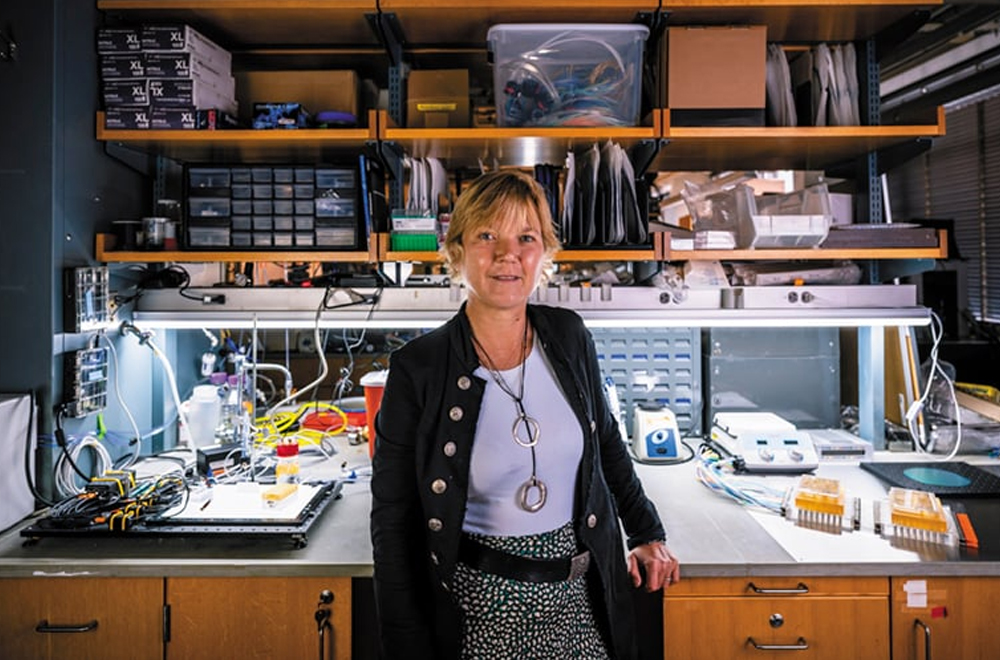Although we often celebrate the grand achievements, there are many ways that Ramblin’ Wrecks are making the world a better placeThis is the third story in a Georgia Tech Alumni (gtalumni.org) series featured in the Summer 2023 issue called “Acts of Kindness”.
A Prescription for Kindness
For Linda Griffith, ChE 82, the Georgia Tech infirmary will always be near and dear to her heart as a place of tremendous kindness and caring.
By Kristin Baird RattiniPhotograph by Duncan O’Boyle
When Yellow Jackets look back at their days on campus, their most meaningful memories might revolve around Bobby Dodd Stadium, Junior’s, or the student center. But for Linda Griffith, ChE 82, the campus infirmary will always be near and dear to her heart as a place of tremendous kindness and caring.Starting in her early teens, Griffith suffered from extremely painful and heavy periods. At the time, she didn’t know their cause: endometriosis, a disorder in which tissue similar to the lining of the uterus migrates elsewhere in the reproductive system and abdomen. But Griffith knew the debilitating symptoms all too well.“The pain was astronomical,” she says. “I would be screaming and crying. I would feel nauseated and often throw up and faint.”She vividly recalls feeling so sick during a morning class in the Chemistry Building that she left to return to her dorm. She didn’t make it there. “I passed out on the path,” she says. “When I woke up, I had no idea where I was.” The classmate who found her drove her to the infirmary.“The infirmary was this haven for me,” she says. “The nurses were extremely happy to care for women students. They were very sympathetic; they understood what I was going through.” There were no effective over-the-counter pain remedies available at that time, so the nurses would give Griffith a shot of Demerol, a powerful narcotic. She would sometimes have to stay overnight or a couple of days until the pain and the medicine’s side effects passed.Griffith returned to the infirmary numerous times during her years at Tech. “I would feel like I was at the end of my rope, and the nurses would be so welcoming and caring,” she says. “There were not many places at Georgia Tech where it was OK just to be a girl and have this ‘girl thing’ going on. The nurses understood. They were amazing.”As Griffith’s pioneering career in tissue engineering at MIT and the severity of her endometriosis advanced in tandem (leading to a hysterectomy in 2001), she found that the compassion and comprehension she’d experienced at the infirmary were sorely lacking elsewhere. She was outraged when a female physician accused her niece of making up her severe symptoms. And she was frustrated that funding for endometriosis research was scarce, despite the fact that 10 percent of women of reproductive age worldwide suffer from the disorder.After winning the MacArthur Fellowship in 2006 for “shaping the frontiers of tissue engineering and synthetic regenerative technologies,” Griffith started pivoting the focus of her own cutting-edge research toward endometriosis. In 2009, she founded the MIT Center for Gynepathology Research to accelerate earlier diagnosis and more successful treatment of endometriosis.“We’ve changed the conversation about the nature of the disease,” she says. She has created complex tissue models of patients’ lesions to test potential treatments. She has called for a “moonshot in menstruation science” to close the funding gap and advance the “FemTech” that offers better solutions for women’s health needs. She has championed a molecular classification for endometriosis, similar to that used for breast cancer. And she has succeeded in persuading specialists to stop using the word “benign” to describe a condition that has caused her and millions of other women pain, infertility, and hardship.“I have a unique position,” she says. “I come as a patient who has had endometriosis and breast cancer, so I am very familiar with the biology of these processes. But I’m also a well-respected scientific engineer. And so the clinicians I interact with are excited because I can come at them with questions informed not only by my own experiences but that of other patients.”








